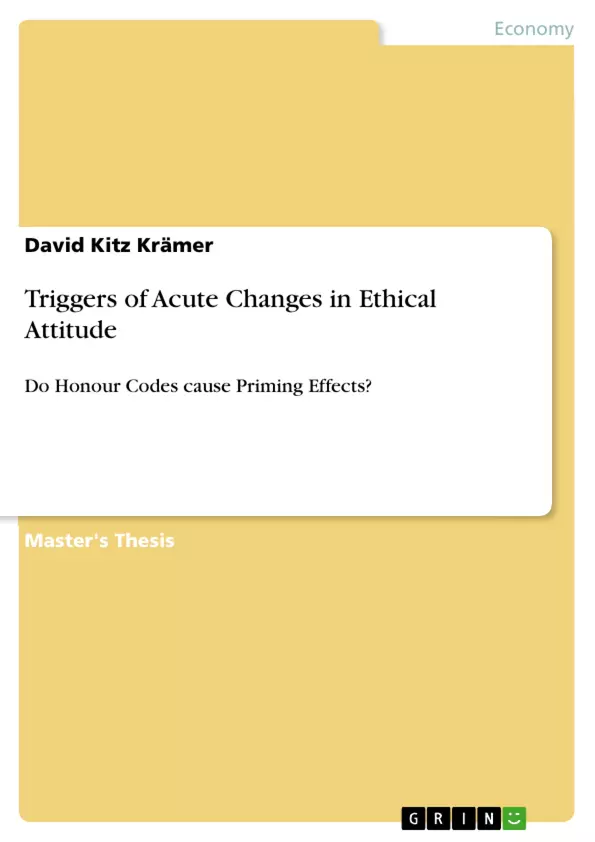This Master Thesis work has dealt with the question of how ethics in general can be improved. In today’s business world Business Ethical Codes of Conduct (BECC), or
more commonly called honour codes, have reached some prominence. However, the question remains still unanswered as to if these measures are really effective, and if so, how efficient they are.
This thesis investigated the effect of a BECC by having individuals read it and measuring their ethical attitude by answering a questionnaire. The results were compared to a group not reading the BECC prior to answering the questionnaire. The aim was to investigate if a BECC has an acute effect that may be based on psychological priming. The results do not suggest that a BECC causes a strong shift in moral thinking in the short term, or even acutely.
The study arrived at some intriguing findings that it did not set out to discover. The reading of the dilemma itself reduced reported moral values. To the knowledge of the author, to date only one study has investigated and shown the same effect that is generally known to psychology as the mere-exposure effect.
A side-alley of investigation was the question whether previous findings on the correlation of age, socio-economic status, and gender (sex) could be confirmed. The
previous reports have been contradictory in their findings.
The current thesis found supporting evidence that age is positively correlated with moral thinking, i.e. growing age correlated with strengthened moral values, which means that individuals agree more with ethical concepts the older they become. In addition, while socio-economic status did not show any correlation with moral thinking, gender did correlate with ethical values in certain respects. It could be shown, that the above mentioned mere-exposure effect exists for the males but not the females in the test-groups.
In summary, changing ethical attitude is possible. However, controlling ethics, i.e. directional influence, is apparently a complicated business that needs more research.
Inhaltsverzeichnis (Table of Contents)
- Abstract
- Acknowledgments
- Introduction
- Theory
- Methodology
- Data Analysis
- Results
- Discussion
- Conclusions
- References
- Appendix
Zielsetzung und Themenschwerpunkte (Objectives and Key Themes)
This master's thesis aims to investigate the influence of Business Ethical Codes of Conduct (BECC) on ethical attitude, particularly focusing on whether exposure to BECC triggers acute changes in moral thinking through psychological priming. The research explores the potential impact of BECC on individuals' ethical decision-making and examines the relationship between age, socioeconomic status, and gender on ethical values.
- The effect of Business Ethical Codes of Conduct (BECC) on ethical attitude
- The role of psychological priming in ethical decision-making
- The influence of age, socioeconomic status, and gender on ethical values
- The "mere-exposure effect" in relation to ethical attitudes
- The complexity of influencing and controlling ethical behaviour
Zusammenfassung der Kapitel (Chapter Summaries)
The thesis begins with an introduction outlining the research problem and the importance of understanding ethical behaviour in the context of global financial crises. The theory section delves into the concepts of ethical attitude, psychological priming, and the impact of BECC on ethical decision-making. The methodology chapter describes the research design, data collection methods, and the specific ethical dilemmas presented to participants. Data analysis focuses on analyzing the results of the ethical questionnaires and investigating the correlations between various demographic factors and ethical attitudes. The results section presents the findings of the study, including the effect of BECC exposure on ethical attitudes and the influence of age, socioeconomic status, and gender. The discussion chapter interprets the results, considering their implications for ethical decision-making and ethical leadership in business. Finally, the conclusions summarize the key findings of the thesis and offer recommendations for future research.
Schlüsselwörter (Keywords)
This study focuses on the key concepts of ethical attitude, psychological priming, Business Ethical Codes of Conduct (BECC), moral decision-making, age, socioeconomic status, gender, "mere-exposure effect", and ethical leadership in the business context. It explores the relationship between these concepts and investigates the potential for influencing ethical behaviour through the use of BECC and other factors.
Frequently Asked Questions
Do Business Ethical Codes of Conduct (BECC) cause immediate shifts in moral thinking?
The study suggests that reading a BECC does not cause a strong shift in moral thinking in the short term or acutely, despite reaching prominence in the business world.
What is the "mere-exposure effect" in the context of ethics?
The study found that the act of reading about an ethical dilemma itself could reduce reported moral values, an effect related to the mere-exposure effect in psychology.
How does age correlate with ethical attitude?
The research found that age is positively correlated with moral thinking; individuals tend to agree more with ethical concepts as they grow older.
Does gender influence ethical values?
Yes, the study showed that gender correlates with ethical values in certain respects, such as the "mere-exposure effect" existing for males but not for females in the test groups.
What is psychological priming in ethical decision-making?
It refers to the idea that exposure to certain stimuli (like an honor code) might unconsciously influence subsequent ethical judgments or behaviors.
- Citation du texte
- David Kitz Krämer (Auteur), 2011, Triggers of Acute Changes in Ethical Attitude, Munich, GRIN Verlag, https://www.grin.com/document/267268



